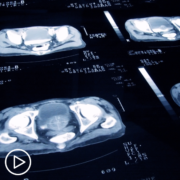How Does Prostate Cancer Progress? Understanding the Stages of Prostate Cancer
How Does Prostate Cancer Progress? Understanding the Stages of Prostate Cancer from Patient Empowerment Network on Vimeo.
What do prostate cancer patients need to know about progression and recurrence? Expert Dr. Xin Gao discusses the difference between progression and recurrence and explains what occurs in the body in different stages of prostate cancer.
Dr. Xin Gao is a Medical Oncologist at Massachusetts General Hospital. Learn more about this expert Dr. Gao.
See More From INSIST! Prostate Cancer
Related Resources

|

|

What Key Factors Impact Prostate Cancer Treatment Decisions? |
Transcript:
Katherine:
Dr. Gao, this program is focusing on advanced prostate cancer. Would you walk us through how the disease progresses in each stage?
Dr. Gao:
Sure. I think advanced prostate cancer can mean a lot of different things, but in general, it means a prostate cancer that has either spread out from the prostate gland itself to other areas of the body or has recurred despite either surgery or radiation-based therapy to the primary prostate tumor.
In each of these situations, typically the focus would on medication types of treatments and we think about advanced prostate cancer as either hormone-sensitive or hormone-resistant, or the other term in the field for it would be castration-resistant, meaning that the prostate cancer is either sensitive to hormonal therapies or perhaps it’s no longer sensitive to the most common type of hormone therapy called androgen deprivation therapy. So, those are sort of the ways that the cancer can progress, and typically all these cancers start as hormone-sensitive prostate cancers and over time, they may evolve and become resistant and become what we call castration-resistant prostate cancer.
Katherine:
Okay. So, they’re not numbered as in a lot of other cancers, like stage I, stage II?
Dr. Gao:
Meaning by stage, oh. So, there are stages. All advanced prostate cancers are by definition stage IV. All advanced cancers, in general, are stage IV but advanced prostate cancer would be stage IV. Most prostate cancers actually present as localized prostate cancer, stage I, stage II, even stage III prostate cancers and the majority of localized prostate cancers are actually, fortunately, quite curable with either surgery or radiation-based therapies.
Unfortunately, not all are curable, and some will recur despite these curative intent treatments, and others might just be inherently more aggressive biologically, and they could even present with metastatic disease or stage IV disease having spread to other sites outside of the prostate gland, even at diagnosis.
When prostate cancer metastasizes or spreads, it commonly spreads by lymphatic vessels or by the bloodstream and most commonly, they tend to go to either lymph nodes or bones or some combination of both. More common areas of lymph node spread are in the pelvic areas, kind of near where the prostate gland is, or deep in the abdomen in an area called the retroperitoneum. And then bones more commonly could be in sort of the back or spine bones or in the pelvic bones, but it could go to other areas less common as well.









